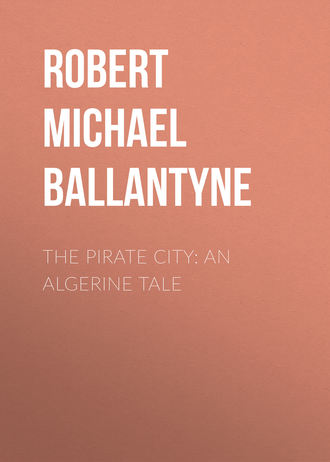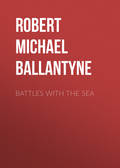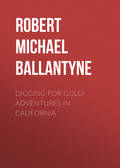
Robert Michael Ballantyne
The Pirate City: An Algerine Tale
The instant Hassan’s eye alighted on them, he stopped and became visibly paler. Omar also stopped, but pretended not to observe the change in his companion’s countenance, nor its cause, as he continued the conversation.
“Hist!” whispered Hadji Baba to his companions, “when enemies become sudden friends, we should know how to act.”
It was evident from the look of anxiety and uncertainty depicted in the visage of the elder chaouse that he did not by any means know how to act. With the stern resolution of a bull-dog nature, however, he suddenly made up his mind to do his duty.
Advancing quickly toward Hassan, he was about to lay hold of him, when Hadji Baba stepped abruptly before him, and said with an affable air and smile—
“His Highness the Dey has sent these good fellows to arrest Sidi Hassan, and I have taken upon my own shoulders the weighty responsibility—being, as is well-known, a fool—to offer our united services in the reversal of the decree by the arrestment of the Dey instead.”
“A bold jest, good fellow, and one that may cost thee thy life, for the present Dey understands not a jest.”
“It is no jest,” returned Baba, with a keen glance at Omar, whom he knew to be a plotter in the state; “my soles tingle now with what they have already received, and my thoughts tingle with what is yet to come. If you have need of friends in the palace here are two—good and true,” said Baba, turning to the chaouses, who stood mute with amazement at the man’s impudence, “and I am one, which makes three, according to the rules of arithmetic. If we are not wanted, then these men must do their duty, for Sidi Hassan is wanted, and we may as well go blithely to our doom together.”
“Fellow,” said Omar sternly, “dost know that I have power to have thee flayed alive without consulting thy master?”
“Nay, not without consulting my master,” said Baba, bowing respectfully, “for my master is before me!”
“In sooth thou art a very impudent knave,” returned Omar, smiling in spite of himself; “and were I the vile plotter thou imaginest, I should be afraid of having such a changeable friend in the palace.”
“Am I changeable for preferring the kind master who was slain to him who slew him?” said Baba simply.
“That is true, Hadji Baba,” returned Omar, suddenly changing his tone.—“Sidi Hassan, fortune is favourable to us. We will trust these men. They dare not play us false even though they would, because their own lives would be forfeited.—Hadji Baba, it may be well for thee to know that, while we avail ourselves of thine aid and that of thy friends, we are quite independent of it, because it happens that the train is already laid, and nothing that thou couldst do, not even the instant alarm of the palace guards, could prevent it from being fired, I believe thee faithful, but this information may help to increase thy fidelity. Go, and, hark ’ee, be very careful to have the guards well placed and looked after to-night at the hour of nine.”
Chapter Nineteen.
Describes an Important Event in the Pirate City
“Madman!” exclaimed the elder chaouse, after Omar and Hassan had left, “you have put the bow-string round our necks as well as your own.”
“True,” answered Baba, with a bland smile, “and if we would not have it drawn tight, we must e’en obey the commands of Omar the Dey.”
“I suppose we must,” returned the chaouse gloomily; “but it is hard enough to be compelled to spend our days in strangling, thrashing, burning, beheading, flaying, and tormenting other men, without the addition of having our own necks put in jeopardy.”
The injustice attaching to themselves and their office seemed to weigh heavily for some time on the minds of both the executioners, notwithstanding the sallies and remonstrances of Hadji Baba, but before reaching the palace they had gone through the not difficult process—to a Turk—of setting the whole matter down to the decrees of Fate, and washing their hands of all guilt.
That evening, as the hour for action drew nigh, Hadji Baba and his colleagues began to grow rather uneasy—all the more so that the Dey was in a particularly bad humour.
Being an ignorant and uneducated man, he had found the work of gathering up the reins of government a very difficult task, notwithstanding the boldness of his heart and the determination of his will. True, he had simplified several knotty matters by bastinadoing and cutting off the heads of all concerned, but this left a multitude of matters which could not be disposed of in that summary fashion.
Among other things, he had been thwarted in his resolution to get possession of Angela Diego, whom he intended to have made a slave of the palace. Finding that she had taken refuge with the British consul at his country house, he sent a peremptory order to have the girl returned immediately, and, pending the result of that order, had locked Bacri up in a dungeon, with threats of the bastinado, and even death, in the event of any difficulty being thrown in the way.
After this he called for his coffee and pipe, his tame gazelle, chief executioners, and story-teller, resolving to throw the cares of state aside for the night and enjoy himself.
It was nearly eight o’clock when this order was given, to the consternation of Hadji Baba and his confederates, who were thus deprived of the power of rendering, in the guard-room, any assistance to the insurrectionists. There was, however, no alternative,—obedience was imperative.
“Sit down,” said the Dey to the unfortunate jester, when he entered the presence, limping with much apparent difficulty. “We will extend clemency to thee, in the hope that thou wilt redeem thy character. I am fond of marvellous stories. Thou mayest sit on that carpet. Now, look behind thee.”
Hadji Baba obeyed, and observed his two friends standing mute and motionless, like statues, ready at a moment’s notice to do their master’s bidding.
“Knowest thou these men?” asked the Dey.
“Your highness’s slave knows them but too well,” replied Baba, with a well-feigned shudder, which changed into a real one on his observing that a gorgeous time-piece opposite pointed to the hour of eight.
“Proceed, then, and acquit thee well, else thou shalt come to know them still better ere long.”
Thus admonished, the story-teller cleared his throat, wished intensely for a draught of water, and taxed his fertile brain to the uttermost. At last under a feeling of absolute desperation, he began—
“Once upon a time—”
The Dey nodded, as though he thought that not a bad beginning.
“Once upon a time,” continued Baba, and then, checking himself—“Your highness wishes a very marvellous story, I believe?”
“Yes, very marvellous,” said the Dey, not quite pleased with the interruption.
“Your highness shall have it—a very marvellous story, and, what is more, it shall be a true story.”
Hadji Baba said this with so much energy and fire that the Dey again nodded his approval, and sent two thin clouds of tobacco-smoke through his nostrils, as he patted the gazelle which crouched at his feet, resting its head on his knee, and gazing affectionately at the tyrant with its magnificent eyes.
“Once upon a time,” resumed the story-teller with sustained vigour and fluency, as he glanced at the clock, “there was a poor shoemaker who dwelt in a certain town, and was noted among his friends for his powers of song. One day the Sultan of the country chanced to hear of this man’s talent, and sent for him to the palace. He was so pleased with him that he made him his chief musician. This shoemaker possessed magical gifts.”
“Villain!” exclaimed the Dey, “didst thou not say that the story should be a true one? How can that be, when thou speakest of gifts which do not and never did exist?”
“Your highness’s slave,” replied Baba, “refers to those powers of legerdemain, or pretended magic, with which some men are gifted.”
“Go on,” returned the Dey.
“Well, one day the shoemaker offered to amuse the Sultan by mesmerising his guards.”
“Mesmerising!” interrupted the Dey, “what is that?”
“Throwing them into a sleep, your highness, against their will.”
“Well?”
“Well, the Sultan did not believe him, so he said, ‘If thou shalt put these guards into sleep against their wills, I will give thee my daughter in marriage.’ The shoemaker was well pleased to hear this, for the Sultan’s daughter was virtuous and very beautiful. So he begged the Sultan to order in his guards, which he did. Drawing them up in a line, the man began at the first, and made the passes or signs which are necessary to throw men into the mesmeric state. The first man winked very much, and smiled a little, but did not fall asleep.
“‘Ha!’ cried the Sultan, on seeing this, ‘thou art deceiving me, it seems!’
“‘Not so, your highness,’ replied the shoemaker; ‘it is not every man who can be thus subdued. Permit me to go on, and I will find one who is susceptible.’
“So the shoemaker went on and made the passes and signs which were necessary, until at last he found one who at once fell asleep, and then, one after another, they all fell asleep, and no one could awake them except the shoemaker! I could not have believed this, your highness,” said Hadji Baba, “if I had not been told it by the shoemaker himself, who also taught me the mysterious power of thus throwing men in to sleep, which in some languages is signified by the term ‘throwing dust into their eyes.’”
“How!” exclaimed the Dey, “dost mean to tell me that thou couldst really do as that shoemaker did, and put my guards to sleep before mine eyes?”
“Your highness’s slave presumes to answer emphatically—yes.”
“By the beard of the Prophet, thou shalt prove it,” said the Dey, whose curiosity was aroused.—“Ho, there! order the guard into my presence.”
“Hold!” exclaimed Hadji Baba; “they must appear absolutely unarmed. In order that men should be brought under the influence of this power, it is necessary that they should divest themselves not only of all ordinary weapons, but also of the defensive armour of common-sense. That is the reason why the exercise of the power is so difficult. But, once accomplished, the effect is unquestionable and very amazing.”
“Let them leave their arms behind them, then,” said the Dey; “only see that two are left to keep the gates.”
“Would it not be well,” suggested Baba humbly, “that, considering the recent riots, more than two should be left to guard the palace gates? It is true, the more men that are brought under my influence the more likely is my influence to be effectual, but these chaouses might for a few minutes supply their place.”
“Be it so!—Thou hearest?” said the Dey, turning to his executioners.
The chaouses went out as the men of the guard entered unarmed, and drew up in a line before the Dey.
“Now, show thy power, Hadji Baba.”
“Your highness will, I trust, have patience for a few minutes,” said Baba, observing that the clock still indicated ten minutes short of the appointed hour, “while I perform the curious, but necessary, motions which are essential to a happy result.”
Saying this he advanced to the first guard in the line, and, throwing himself into a vigorously picturesque attitude, pointed with two fingers of the right hand at his eyes, trembling violently the while, as though he was exerting some tremendous but subtle energy.
The first guardsman gazed at him in mute amazement, but would as soon have cut off his own head as have objected to the operation in such presence. He opened his eyes very wide with surprise, then looked at the points of Baba’s fingers, which caused him to squint horribly, and finally smiled in spite of himself; whereupon the thought of having been guilty of such undignified conduct caused him to turn deadly pale with terror, all of which symptoms being regarded by the Dey as indications of coming success, were highly satisfactory.
Suddenly sweeping his hands in front of the man’s face, and making a noise with his feet to distract attention, Baba whispered, “Shut your eyes if you would escape death!” and terminated the whole operation with a low growl.
The terrified man instantly shut his eyes, and Baba proceeded to operate on the next.
He had operated thus on about six of the men when there was heard a sudden crash and shouting in the guard-room. The disarmed guard at once made a rush towards the door, but were driven back by the chaouses, who sprang in and cut down two of the foremost with yataghans which were already blood-stained.
“Traitor!” shouted the Dey, drawing his scimitar and leaping furiously on Hadji Baba, but that worthy, being as active with his body as his brain, parried the cut with a cushion, and running in on the Dey seized him round the waist. It would soon have gone hard with him, however, Hamet being a much more powerful man, had not Sidi Omar, with a band of his janissaries, dashed in and secured him.
“But for enemies within thou hadst not overcome me thus easily,” said the Dey bitterly, as two of the soldiers held him fast, while others bound his arms behind his back.
“Very true, Hamet,” returned Omar, with quiet indifference of manner; “and now it remains with thee to choose thy death, for that must be speedily accomplished.—Ho! there, fetch the cup!”
A silver cup, filled with poison, was brought and presented to the unhappy Hamet by his former friend, Sidi Hassan.
“My undoing has been caused by leniency to dogs like thee,” said the Dey, with a dark scowl; then, clearing his brow, and drawing himself up with dignity, he turned to Omar, and added, “I decline to take part in mine own death. If I must die, let me be led forth to the place of public execution. I would die as I have lived: with my face to my foes, and in the sight of my comrades.”
“Be it so, we are ready,” returned Omar; “let the torch-men lead the way.”
As Omar truly said, they were indeed ready, for in a few seconds the front of the palace was lighted up with blazing torches, a procession was formed, and Hamet was led forth to the Bab-Azoun gate, and there strangled in the midst of an overawed and silent populace, who probably cared very little as to which of the unruly Turkish pirates who held them in subjection should misrule the unfortunate city.
Whether it was a touch of pity on the part of Omar, or the lateness of the hour, we know not, but from some cause or other Hamet was spared the too common cruelty of being twice revived with a glass of water during the process, before the final deed of strangulation was accomplished.
Thus was the undesirable throne of Algiers again emptied, and immediately afterwards Sidi Omar ascended it,—the third Dey within forty-eight hours!
Chapter Twenty.
Describes a Retreat among the Hills
Let us turn now, good reader, to a scene more congenial—namely, the garden in front of the British consul’s country residence.
One evening, two weeks after the event just narrated, Ted Flaggan and Rais Ali chanced to meet at the gate.
“Ye’ve got stirrin’ times of it here intirely. Mister Ally Babby,” said the tar, whose familiarity almost verged on impudence; “what betwane you an’ the 40,000 thieves—more or less—in the town, I find it rare entertainment.”
“Yoos complimentary dis marnin’,” returned the interpreter, with a smile.
“It’s always the way with me. I howld that purliteness is chape.—Ye’ve heard the noos, I s’pose?”
“W’at noos?” demanded Ali.
“W’y, the noos that the war betwane this Raigincy of Algiers an’ Tunis is goin’ on raither favourable, and that forty mules were brought in this morning loaded with human heads.”
“Oh yes, I heers dat,” replied Ali carelessly, as he filled his pipe from Flaggan’s tobacco-pouch. “I sees all de hids as I comes up de road dis marnin’. Twinty more mule hims ’xpec’ for come in de morrer mornin’.”
“You don’t mane it!” said Ted. “They seem to be free of their heads away at Tunis.—But there’s more noos than that,” continued the seaman, calmly scanning the seaward horizon, as he filled his pipe. “Have ’ee heard that the Dey Omar has cut off the head of Sidi Hassan for nothin’ worse than a touch of imperliteness?”
“No, I not heers dat,” answered Ali, with a look of interest. “I’s werry glad.”
“Glad! why so?”
“’Cos Sidi Hassan hims gib me reason to ’xpec’ hims cut off my hid soonerer or laterer.”
“It’s my opinion,” said Flaggan, with a peculiar smile, “that if ye go cutting away at one another like that, soonerer or laterer you’ll all be like the converse o’ the Kilkenny cats, and have nothin’ left of ’ee but your heads stickin’ on spikes above your gates and walls.”
“Pr’aps so,” was Ali’s complacent reply.
At this point the conversation was interrupted by the sudden appearance of Angela and her sister Paulina, who carried in her arms the little Angelina. Following them at some distance came the amiable Zubby, bearing aloft on her shoulder—as being the place of greatest safety—Colonel Langley’s youngest hope. Master Jim’s back-bone had not at that time attained sufficient stiffness to warrant the position, but Zubby never thought of that; and Master Jim consequently complained in a series of yells and wry faces; but Zubby, being ignorant of the state of his feelings, did not mind that. Master Jim soon became purple in the visage, but Zubby, looking up at him, and supposing the effect to be the result of an unusual flow of spirits, rather enjoyed that than otherwise.
“Pr’aps I may be excused for the observation,” said Flaggan, removing his pipe for a moment, and gazing over Paulina’s shoulder, “but if that youngster ain’t being strangulated he looks oncommon—”
A scream from Paulina, as she rushed back and bestowed on Zubby a box on the ear cut short the seaman’s observation.
“Have I not told you again and again, girl, never to put the child on your shoulder?”
“Oh, mim, me forgit,” exclaimed the penitent Zaharian.
“That will keep you in remembrance, then,” said Paulina, giving her another slap.
Her own little one woke up at this point and crowed, being too young, we presume, to laugh.
“Oh, Signor Flaggan,” said Angela earnestly, while her sister entered into converse with the interpreter, “have you heers yit ’bout de Signors Rimini?”
Angela had already acquired a very slight amount of broken English, which tumbled neatly from her pretty lips.
“Whist, cushla, whist!” interrupted the seaman, leading the girls slowly aside; “ye mustn’t spake out so plain afore that rascal Ally Babby, for though he’s a good enough soul whin asleep, I do belave he’s as big a thafe and liar as any wan of his antecessors or descendants from Adam to Moses back’ard an’ for’ard. What, now, an’ I’ll tell ’ee. I have heerd about ’em. There’s bin no end a’ sbirros—them’s the pleecemen, you know miss—scourin’ the country after them; but don’t look so scared-like, cushla, for they ain’t found ’em yet, an’ that feller Bacri, who, in my opinion, is the honestest man among the whole bilin’ of ’em, he’s bin an’ found out w’ere they’re hidin’, an—” here the seaman’s voice descended to a hoarse whisper, while his eyes and wrinkled forehead spoke volumes—“an’ he’s put me in commission to go an help ’em!”
“Dear man!” exclaimed Angela.
“Which,—Bacri or me?” asked Flaggan.
“Bacri, o’ course,” returned Angela, with a little laugh.
Flaggan nodded significantly.
“Yes, he is a dear man w’en you go to his shop; but he’s as chape as the most lib’ral Christian w’en he’s wanted to go an’ do a good turn to any one.”
“And yoo sure,” asked the girl, with rekindled earnestness in her large black eyes, “dat all Rimini safe—Francisco an’ Mar—”
“Ah, all safe,—Mariano inclusive,” said the sailor, with an intelligent nod. “I sees how the land lies. Depend on it that young feller ain’t likely to part with his skin without a pretty stiffish spurt for it.”
Although much of Flaggan’s language was incomprehensible to the pretty Sicilian, it was sufficiently clear to her sharp intelligence to enable her to follow the drift of his meaning; she blushed, as she turned away her head with a queen-like grace peculiarly Italian, and said—
“When yoo go hoff—to seek?”
“This werry minit,” answered the sailor. “In fact I was just castin’ about in my mind w’en you came up how I could best throw Ally Babby off the scent as to w’ere I was goin’.”
“Me manages dat for yoo,” said Angela, with a bright significant smile, as she turned and called to the interpreter.
Ali, who was rather fond of female society, at once advanced with a bow of gracious orientality.
“Com here, Ali; yoo most ’xplain de flowers me bring hom yiserday.”
The polite Moor at once followed the pretty Italian, leaving Ted Flaggan with her sister.
“You’ll excuse me, ma’am, if I bids you raither an abrup’ good marnin’. It’s business I have on me hands that won’t kape nohow.”
Leaving Paulina in some surprise, the blunt seaman put his hands in his pockets, and went off whistling in the direction of Algiers. Turning aside before reaching the town, he ascended the Frais Vallon some distance, meeting with a few Arabs and one or two soldiers, none of whom, however, took much notice of him, as his stalwart figure and eccentric bearing and behaviour had become by that time familiar to most of the inhabitants of the town. It was known, moreover, that he was at the time under the protection of the British consul, and that he possessed another powerful protector in the shape of a short, heavy bludgeon, which he always carried unobtrusively with its head in the ample pouch of his pea-jacket.
As he proceeded up the valley, and, gradually passing from the broad road which had been formed by Christian slaves, to the narrow path at its somewhat rugged head, which had been made by goats, he grew more careless in his walk and rollicking in his air. At last he began to smile benignantly, and to address to himself a running commentary on things in general.
“You’ve got a fine time of it here all to yersilf, Mister Flaggan. Ah, it’s little the Dey knows what yer after, me boy, or it’s the last day ye’d have to call yer own. Well, now, it’s more like a drame than anything I knows on. What wid Turks an’ Moors an’ Jews, an’ white slaves of every lingo under the sun, I can’t rightly make out to remimber which it is—Europe, Asia, Afriky, or Ameriky—that I’m livin’ in! Never mind, yer all right wid that blissid cownsl at yer back, an’ this purty little thing in yer pokit.”
He became silent, and seemed a little perplexed at this point, looking about as if in search of something.
“Coorious; I thought it was here I left it; but I niver had a good mimory for locality. Och! the number of times I was used to miss the way to school in Ould Ireland, though I thravelled it so often and knowed it so well! Surely an’ it worn’t under this rock I putt it, it must have bin under a relation. Faix, an’ it was. Here ye are, me hearty, come along—hoop!”
Saying this, he gave a powerful tug at something under the rock in question, and drew forth a canvas bag or wallet, which had the appearance of being well filled.
Slinging this across his shoulder, Ted Flaggan pursued his way, moralising as he went, until he came to a rugged hollow among the hills, in which was a chaos of large stones, mingled with scrubby bushes. Here he paused again, and the wrinkles of perplexity returned to his brow, as he peered hither and thither.
Presently he observed a sharp-edged rock, which, projecting upwards, touched, as it were, the sky-line behind it. Moving to the right until he brought this rock exactly in line with another prominent boulder that lay beyond it, he advanced for about fifty yards, and then, stopping, looked cautiously round among the bushes.
“It must be hereabouts,” he muttered, “for the Jew was werry partikler, an’ bid me be partikler likewise, seein’ that the hole is well hid, an’ wan is apt to come on it raither—hah!”
Suddenly poor Ted fell headlong into the very hole in question, and would infallibly have broken his neck, if he had not happened to descend on the shoulders of a man who, crouched at the bottom of the hole, had been listening intently to the sound of his approach, and who now seized his throat in a grip that was obviously not that of a child!
The British tar was not slow to return the compliment with a grasp that was still less childlike—at the same time he gasped in much anxiety—
“Howld on, ye spalpeen, it’s after yersilf I’ve come, sure; what, won’t ye let go—eh?”
It was quite evident, from the tightening of the grip, that Mariano had no intention of letting go, for the good reason that, not understanding a word of what was said, he regarded the seaman as an enemy. Feeling rather than seeing this, for the hole was deep and dark, Flaggan was under the necessity of showing fight in earnest, and there is no saying what would have been the result had not Lucien suddenly appeared from the interior of a subterranean cavern with which the hole communicated.
Lucien understood English well and spoke it fluently. One or two of Flaggan’s exclamations enlightened him as to the true character of their unexpected visitor.
“Hold, Mariano!” he cried; “the man is evidently a friend.”
“What’s that ye’re saying?” cried Flaggan, looking up, for he was still busy attempting to throttle Mariano.
“I tell my brother that you are a friend,” said Lucien, scarce able to restrain laughter.
“Faix, then, it don’t look like it from the tratement I resaive at yer hands.—Howsoever,” said the seaman, relaxing his grip and rising, while Mariano did the same, “it’s well for you that I am. Bacri sent me wid a few words o’ comfort to ’ee, an’ some purvisions, which I raither fear we’ve bin tramplin’ about in the dirt; but—no, here it is,” he added, picking up the wallet, which had come off in the struggle, “all right, an’ I make no doubt it’ll be of use to ’ee. But it’s a poor sort o’ lodgin’ ye’ve got here: wouldn’t it be better for all parties if we was to go on deck?”
“Not so,” said Lucien, with a smile, as he fell in with the seaman’s humour. “’Twere better to come to our cabin; this is only the hold of our ship.—Follow me.”
So saying he went down on his hands and knees and disappeared in an impenetrably dark hole, not three feet high, which opened off the hole in which they stood.
Mariano pointed to it and motioned to the sailor to follow.
“Arter you, sir,” said Ted, bowing politely.
Mariano laughed and followed his brother, and Ted Flaggan, muttering something about its being the “most strornar companion hatch he’d ever entered,” followed suit.
A creep of two or three yards brought him into a cavern which was just high enough to admit of a man standing erect, and about eight or ten feet wide. At the farther extremity of it there was a small stone lamp, the dim light of which revealed the figure of stout Francisco Rimini sound asleep on a bundle of straw, wrapped negligently in his burnous, and with a stone for his pillow. Beside him stood an empty tin dish and a stone jar of the picturesque form peculiar to the inhabitants of the Atlas Mountains; the sword given to him by Bacri lay within reach of his half-open hand.
Neither the scuffle outside nor the entrance of the party had disturbed the old man.
“My father is worn out with a fruitless search for food!” said Lucien, sitting down on a piece of rock and motioning to the seaman to do likewise. “We can venture out in search of food only at night, and last night was so intensely dark as well as stormy that we failed to procure anything. Our water jar and platter are empty.”
“Then I’ve just come in the nick of time,” said Flaggan, proceeding to unfasten his wallet and display its much-needed contents.







